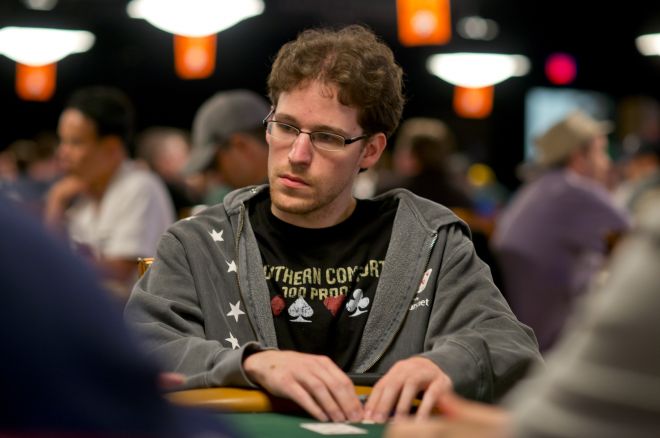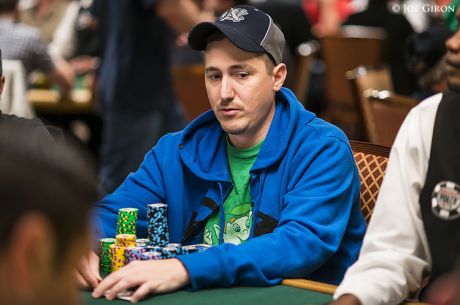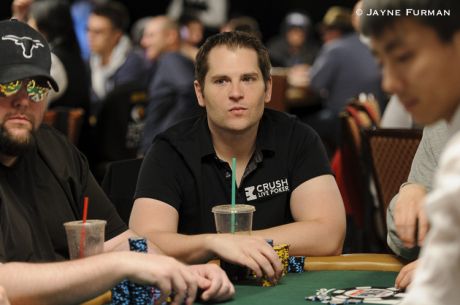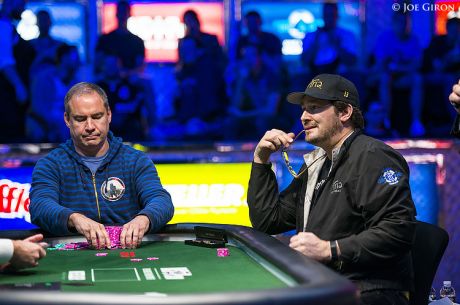Facing Tough Decisions On Seventh Street in Razz with Mickey Doft

Mickey Doft has been a tournament reporter and contributing writer for PokerNews since 2008. The man from Aventura, Florida, is a big fan of Hilary Duff, can replicate hundreds of WWE wrestler entrances, and has a hobby of roller blading, although he can't stop. Those are all things that many people in the world may dislike, and similarly, whereas many people might consider it torturous to play razz, Doft loves it.
For a few years now, Doft's go-to event at the World Series of Poker has been the low buy-in razz tournament. This year, it was the $1,500 Razz that began on Monday. Previously, Doft's venture to the felt has come up empty handed as he's fell short of reaching the money in his first five attempts. This year, however, he charged into Day 2 with the 11th-largest stack in the room and worked his way into the money for a 46th-place cash for $2,738.
After entering Day 2 with 41,000 in chips, Doft lost two big hands early, each of which had betting on all streets. The first hand was against Dany Georges, and the second hand was against Chad J. Brown. Let's take a look.
Georges: (XxXx) / 10x3x5x7x / (Xx)
Doft: (XxXx) / 6x10x3x10x / (Xx)
After a player with a Kx up on third brought in, Georges completed the bet. Doft raised, and then action folded back to Georges. He called. On fourth street, Georges took the lead with a better ten and he led with bets on each street from there. Doft called down the entire way until seventh street, even despite pairing his ten on sixth. After Georges bet again on seventh, Doft tanked to think about his decision.
"On sixth street, I had two low wheel cards in the hole, so I know that I'm drawing to a hand that can beat a seven if I improve," Doft said. "I think I had 5x2x, if I remember correctly, so my hand is very strong against someone who is trying to steal with a ten. The way the hand began, there was a dead stack to my left and then the next player was the bring-in, so my opponent here is likely on a steal with only me to compete with."
Doft continued, "If he runs out perfect from the start and made a seven, it's just somewhat unfortunate for me. Given the dynamic, my ten-six is in the lead a good amount of the time, but it's not good enough to be raising. He can reraise me with a better made hand or get aggressive with a better draw, and that means I'm putting in bets behind a lot of the time. It's important in razz, and other stud games, that you're not often putting in bets when you're behind with only one card to come.
"This situation goes back to a hand I played two years ago against Justin Bonomo. Basically, when my opponent bets on the river and I don't have too much information on him as a player, usually if he's betting into seventh and I'm not sure if I believe them on sixth, then he's polarized �� they either have a very good hand and are looking for value, or they are bluffing. There's really not many times this spot will be someone looking for thin value. In spots where I don't have too much information and it's basically a 50-50 guessing game, I'm going to lean towards calling because of the size of the pot. If there wasn't so much action preceding the river and not as much money in the pot, my price wouldn't be as good."
As it turned out, Georges showed 9x6x2x, and Doft mucked as he was unable to beat Georges' seven-six low.
Shortly after that hand, Doft was involved with another that involved him being put in a tough spot on seventh street as to whether or not he should make a call. This hand was against Brown.
Doft: (XxXx) / 8x6x9x5x / (Xx)
Brown: (XxXx) / 7x3x3x4x / (Xx)
On this hand, Richard Ashby brought in with a Kx, Doft completed with his eight, and then Brown called. Ashby folded. Brown led with a bet on fourth and then bet again on fifth after Doft checked to him, despite pairing up with threes. On sixth and seventh, Doft checked both times and was faced with bets from Brown. On the end, like the hand above, Doft went into the tank.
"I don't want to bloat the pots, and I'm sure my frame of mind wasn't that great after the last loss," Doft remembered. "I'd like to say I shook it off, but I would be lying if I said it didn't affect me. I know I'm never folding on fifth street here, and I checked with the intention of calling, just trying to keep the pot on the smaller side. I had 2x4x under here, and he would've showed me a lot of weakness if he checked on sixth street. Like the hand before, in this one my opponent is polarized again. On sixth, he either has a solid made hand or he's bluffing because I have at worst a nine and likely an eight. You're never going to win a big pot at showdown if every time your opponent hits a low card, you just give up. While there isn't as much bluffing in limit games versus no-limit or pot-limit ones, there is still bluffing and you have to be prepared to pick off bluffs in scary spots. Unfortunately, my opponent showed me Ax10x2x and had the goods."
After Doft lost those two hands, his stack suffered a bit of a hit, but he was able to get a chunk back on the following hand. Again, he was faced with a decision on seventh street against Georges in a hand that also involved Michael Block, who folded on fifth street.
Georges: (XxXx) / JxAx3x2x / (Xx)
Doft: (XxXx) / 6x9x7xKx / (Xx)
Block: (XxXx) / 4xQx5x -- folded on fifth
In this hand, it began interestingly. Brown had the highest Jx and was the bring-in, but he tried to pay the bring-in and then fold his hand. After he was informed that wasn't allowed and he must wait his turn, Block limped in, Georges called, and then Doft completed the bet. Brown folded, but Block and Georges called.
On fourth street, Doft led the betting and was called in both spots. On fifth street, Doft and Block checked, Georges bet, Doft called, and Block folded. Georges then took the lead with the best hand showing on sixth street and bet. Doft called. Before seventh street was dealt, Georges bet in the dark, and this was of notice to Doft.
"When Block folds fifth street despite getting a five, it tells me he paired the five," Doft said. "That means I can assume there are two fives and one four gone, which are three wheel cards that Georges can't have. When he limps with a jack up, he likely has two wheel cards in the hole, and knowing that it's likely that he paired up on fourth, fifth, or sixth. This hand really has to do with all of the up cards and some basic assumptions on the hand. When Georges calls on fourth street after getting an ace, it's likely that he doesn't have another ace in the hole, so pairing up on fifth or sixth is more likely.
"Once the hand gets to sixth, my hand looks just about as bad as it could get, but I'm just bluff-catching at this point," Doft continued. "At best, I feel he paired up and has a wheel draw with a made jack. After he bets seventh in the dark, it shows weakness to me. I just feel when players bet in the dark on seventh that they give something away and that they're trying to overcompensate with strength to scare you out. I didn't believe my opponent here before seventh, so why would I not call again on seventh street when he bets in the dark before he even looks? When I call sixth thinking I'm ahead through all the reasoning I explained, I'm also calling seventh when he bets in the dark."
Want to stay atop all the latest in the poker world? If so, make sure to get PokerNews updates on your social media outlets. Follow us on Twitter and find us on both Facebook and Google+!









